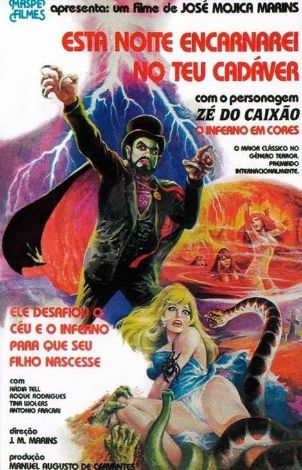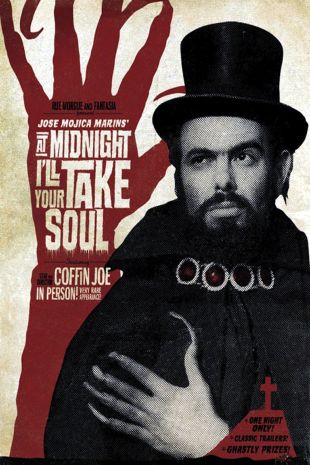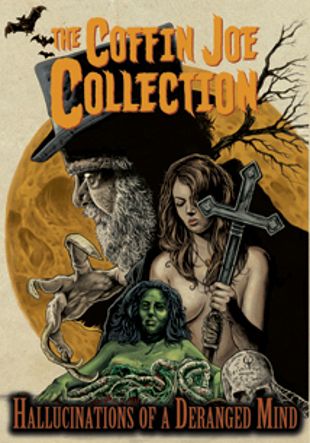With his nightmarish alter ego haunting the psyches of Brazilian children of the mid-'60s, Jose Mojica Marins' frighteningly sacrilegious antihero Coffin Joe (aka Ze do Caixao) served as a precursor to such American horror icons as Freddy Kreuger. Laughing in the face of religious tradition and sporting his traditional top hat and black cape, the thick-bearded Coffin Joe became something of a cultural icon in his native Brazil, with parents often using the taloned gravedigger as a means to instill moral values into their children as well as provide them with incentive to eat their vegetables and get to bed on time.
Born the son of a bullfighter on Friday, March 13 in Sao Paolo, Brazil, Marins became enamored with film after his family moved into his father's cousin's movie theater in the neighborhood of Vila Anastacio. With his mother working as the theater manager and young Jose literally residing behind the theater's screen, the aspiring filmmaker found inspiration in both comic books and a steady diet of movies. After receiving an 8 mm camera for his tenth birthday, Marins, inspired by the book of Revelations, crafted the ominous Last Judgment with funds acquired by passing a hat around the theater and creating a "cultural toll" on the Anhanguera highway (i.e. Marins' friends lying in the road and refusing to move unless unwitting travelers committed to a "donation"). It was during the production of God's Sentence (1958) that the director began to develop a cured reputation. Following the death of two actresses and the severe injury to a third, Marins halted production and decided to team with writer Aurelina Sa Porto to turn the film into what would become a successful novel. Next came My Destiny in Your Hands (1962), and shortly thereafter, inspiration to the character who would become Marins' calling card. Inspired by a nightmare in which a faceless caped figure presented Marins with a tombstone revealing the date of both his birth and his death, the frightened youngster awoke eager to project the intense internal terror he felt onto celluloid for all to experience. With actors reluctant to step into the shoes of Coffin Joe lest the character come off as more silly than menacing, Marins donned the costume himself and began production on a shoestring budget with little to no resources. Screened in seedy small theaters and in the back tents of Brazilian carnivals, At Midnight I'll Take Your Soul terrified audiences, with its literal nightmare origins potently shining through the projector and bringing out the public's worst fears regarding disdain for religious tradition and the moral pitfalls of blasphemy. Continuing to develop the character with such subsequent films as This Night I Will Possess Your Corpse (1966), The Strange World of Coffin Joe (1968), Awakenings of the Beast (1970), and The Black Exorcism of Coffin Joe (1974), the horrific character engrained himself in the public psyche to become an unparalleled south-of-the-equator horror icon.
Marins' continued work outside of the realm of his most famous persona never quite lived up to the horrifying standards he previously set, and the director would later begin to rely more on sexual exploitation in his later adult films. His films kept in international circulation by such dedicated companies as Something Weird Video, Coffin Joe experienced a revival of sorts when Fantomas video released At Midnight I'll Take Your Soul, This Night I Will Possess Your Corpse, and Awakening of the Beast to a new and unassuming audience in a series of restored and respectfully presented DVDs. In addition, a documentary entitled Coffin Joe: The Strange World of Jose Mojica Marins (2001) followed Marins' unique career path as one of Brazil's most censored auteurs and presented his remarkable career to a new generation of independent filmmakers.


